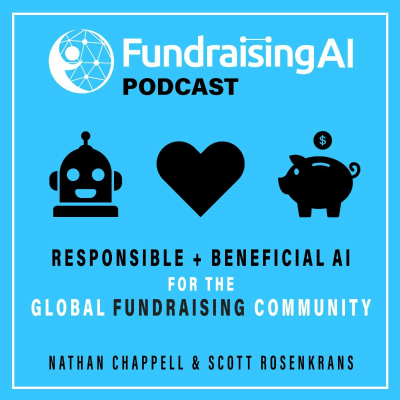
FundraisingAI
Podcast von Nathan Chappell, Scott Rosenkrans
Diesen Podcast kannst du überall hören, wo es Podcasts gibt und auch ohne Mitgliedschaft in der Podimo App.
Alle Folgen
45 FolgenIn this episode, Nathan and Scott explore the concept of anthropomorphizing AI, delving into how simple acts like saying "please" and "thank you" can transform how we interact with AI tools. The duo examines best practices and philosophies around polite interactions with AI, referencing Conor Grennan's rationale and the "Hi, Great, Thanks" (HGT) framework for polite, human-centered exchanges. They also highlight the importance of distinguishing between collaborative and transactional AI tasks to optimize user experience. Nathan and Scott compare various AI tools, including ChatGPT, Copilot, and Perplexity, noting their strengths and weaknesses. Moreover, they discuss the role of memory in AI tools and how leveraging AI memory enhances productivity while maintaining user control. Looking toward the future of AI and human interaction, Nathan and Scott emphasize the importance of balancing AI efficiency with preserving human qualities like good manners and empathy. They advocate for thoughtful, intentional use of AI in personal and professional settings, maintaining a human-centered approach in an evolving technological landscape. EPISODE HIGHLIGHTS [02:14] The Concept of Anthropomorphizing AI [04:27] Best Practices and Philosophies Behind Using "Please" and "Thank You" [08:25] Comparing Different AI Tools and Their Effectiveness [13:18] The Role of Memory in AI Tools [19:00] The Future of AI and Human Interaction [27:52] Upcoming Topics TIPS AND TOOLS TO IMPLEMENT TODAY * Start and end AI interactions with "please" and "thank you" to encourage mindfulness. * Use collaborative AI like ChatGPT for creative tasks and factual tools like Perplexity for research. * Always double-check AI-generated outputs, especially in critical contexts. * Regularly save final versions of work in AI with memory to maintain consistency. * Experiment with different tools (ChatGPT, Copilot, Perplexity) to find the best fit for specific needs. * Combine AI efficiency with maintaining human qualities like empathy and good manners. * Use "Hi, Great, Thanks" as a simple framework for polite AI interactions. * Identify ways AI can save time and reinvest it into strategic or creative tasks. * Continuously learn about AI capabilities and limitations to use tools effectively. * Encourage thoughtful AI use in personal and professional settings to minimize risks and maximize benefits. RESOURCES Connect with Nathan and Scott: LinkedIn (Nathan): linkedin.com/in/nathanchappell/ [https://www.linkedin.com/in/nathanchappell/] LinkedIn (Scott): linkedin.com/in/scott-rosenkrans [https://www.linkedin.com/in/scott-rosenkrans-916b9139/] Website: fundraising.ai/ [https://fundraising.ai/]
Meet Jean Westrick, an Executive Director at the Technology Association of Grantmakers (TAG). She has 20+ years in philanthropy, specializing in technology strategy, program execution, and foundation operations. Before being the next Executive Director of the Technology Association of Grantmakers, Jean was the Director of IT Strategy and Communications at The Chicago Community Trust, where she led change management efforts for the foundation's digital transformation initiative. Also, while at the Trust, Jean directed On the Table, an award-winning engagement model designed to inspire resident action, replicated in 30 cities nationwide. During today's conversation, Jean shares her journey through philanthropy and technology while shedding light on the evolving intersection of these fields. Starting with her reflections on the collaborative spirit at Impact House in Chicago—a dynamic space for change-makers—Jean explores the importance of fostering community and partnerships in advancing social missions. As the discussion transitions to her role at TAG, Jean recounts her career path, from civic engagement projects at the Joyce Foundation and Chicago Community Trust to her unexpected but transformative shift into technology roles within philanthropy. She highlights the critical role technology plays in amplifying impact and discusses the need for the philanthropic sector to embrace tools like AI responsibly. Jean introduces TAG's Responsible AI Adoption Framework, delves into key findings from the State of Philanthropy Tech Survey, and emphasizes the importance of data governance, privacy, and inclusive access to AI tools. Throughout the conversation, she and Nathan explore the philosophical and practical implications of AI in the nonprofit world, the democratization of technology, and the sector's responsibility to maintain trust and resilience in communities. The dialogue concludes with Jean sharing her favorite AI tools, practical advice for navigating the tech landscape, and a call for collaboration to ensure technology aligns with and enhances philanthropy's core mission. EPISODE HIGHLIGHTS [01:16] Impact House: A Hub for Collaboration and Change-Makers in Chicago [03:10] Jean's Career Journey and Transition to TAG [08:52] Jean's Accidental Tech Journey [14:39] Responsible AI Adoption Framework [18:06] Learnings from State of Philanthropy Tech Survey [23:09] Philanthropy's Role in AI Adoption [27:33] Trust and Resilience in Philanthropy [30:20] Jean's Go-To AI Tool TIPS AND TOOLS TO IMPLEMENT TODAY * Create environments to encourage innovation and community-building. * Leverage tools to streamline operations and enhance impact. * Adopt frameworks to ensure AI aligns with your mission and maintains trust. * Invest in policies to ensure privacy, security, and quality data for AI adoption. * Involve all levels of your team in adopting and governing new technologies. * Encourage asking questions and exploring tools like ChatGPT or Claude to understand their potential. * Ensure grant makers and recipients are on the same page regarding tech and AI use. * Incorporate diverse perspectives to address complex challenges in tech adoption. * Use technology to address the root causes of societal issues and adapt to rapid change. * Experiment with AI tools integrated into daily workflows, tailoring choices to fit organizational needs. RESOURCES Connect with Jean: Linkedin: linkedin.com/in/jeanwestrick [https://www.linkedin.com/in/jeanwestrick] Mentioned in the episode: State of Philanthropy Tech Survey: tagtech.org/report/2024-state-of-philanthropy-tech-survey/ [https://www.tagtech.org/report/2024-state-of-philanthropy-tech-survey/] TAG's AI resources, including our Framework for Responsible AI Adoption in Philanthropy: tagtech.org/ai-resources-for-philanthropy/ [https://www.tagtech.org/ai-resources-for-philanthropy/] Connect with Scott and Nathan Scott - linkedin.com/in/scott-rosenkrans-916b9139/ [https://www.linkedin.com/in/scott-rosenkrans-916b9139/] Nathan - linkedin.com/in/nathanchappell/ [https://www.linkedin.com/in/nathanchappell/]
Starting today's conversation, Nathan and Scott discuss practical takeaways from recent conferences, including Scott's experience at the AFP Kindleberger Forum, where he saw firsthand how AI can empower small nonprofits with limited resources. They also explore the unique advantages smaller organizations have in adopting AI, given their agility and innovative potential. They propose forming nonprofit AI clubs to foster collaboration and share knowledge within the sector. The two delve into the growing integration of AI in everyday tools, such as using AI to summarize PDF documents and leveraging ChatGPT's new features for greater efficiency. They share personal anecdotes, like Nathan using ChatGPT to translate in real-time, illustrating AI's potential to streamline tasks. The conversation also touches on ethical considerations, with a thought-provoking discussion on balancing human values and AI's impact on relationships. Emphasizing responsible adoption, Nathan and Scott close with a call to action for the fundraising community to embrace AI thoughtfully, as they believe it can amplify missions and support professional growth in powerful ways. EPISODE HIGHLIGHTS [03:06] Takeaways From Recent Conferences [04:34] Challenges and Opportunities for Small Nonprofits [09:38] AI Integration and Everyday Use [12:59] Advanced Features of ChatGPT [20:54] The Blend of Human and AI [24:43] Conclusion and Call to Action TIPS AND TOOLS TO IMPLEMENT TODAY 1. Use ChatGPT for quick content creation, brainstorming, and outreach templates. 2. Use tools like Adobe Acrobat's AI to quickly summarize reports or articles. 3. Start or join an AI club within your nonprofit community to exchange ideas and best practices. 4. Participate in AI and fundraising events to stay updated on trends and tools. 5. Don't just use AI—make it part of your long-term strategy to amplify mission impact. 6. Try features like Canvas, voice mode, or in-depth searches to enhance productivity. 7. Small nonprofits can often implement AI faster—begin with basic tools, then expand as needed. 8. Utilize AI translation in real-time to bridge language gaps with donors or volunteers. 9. Educate teams on ethical AI practices and consider the social impact of AI decisions. 10. Encourage feedback and share your AI experiences with others in the fundraising sector for collective learning. RESOURCES Scott Rosenkrans on Linkedin: linkedin.com/in/scott-rosenkrans [https://www.linkedin.com/in/scott-rosenkrans-916b9139/] Nathan Chappell on Linkedin: linkedin.com/in/nathanchappell/ [https://www.linkedin.com/in/nathanchappell/]
In today's conversation, Subha Vadlamannati, founder and CEO of OpenNLP Labs and a student at Stanford, shares her journey and mission to make natural language processing (NLP) accessible for low-resource and marginalized languages. She explains the organization's focus on real-world applications of NLP, especially for languages underrepresented online, despite the vast number of global languages. Subha underscores the consequences of excluding these languages from digital resources, sharing real-world examples where language barriers caused life-threatening issues. Highlighting Open NLP Labs' innovative tools, such as Edu Link and Polyglot, Subha discusses their aim to support learning and communication in over 100 low-resource languages. Subha also describes their research on fairness and bias in AI, emphasizing ethical AI practices to make technology more inclusive and responsible. She touches on the challenges of scaling fair AI and the importance of accurate, diverse datasets, especially as AI progresses toward multimodal applications in text, audio, and video. The conversation includes practical advice for nonprofit leaders looking to use AI, encouraging a mission-aligned approach and community engagement. Subha concludes by expressing hope for the future of ethical AI, her dedication to advancing research in robotics and multimodal applications, and her encouragement for young researchers to join the field, driven by inclusivity and ethical responsibility. EPISODE HIGHLIGHTS [01:30] Meet Subha! [02:39] Understanding Low Resource Languages [04:54] Importance of Language Representation [06:54] Challenges and Solutions for Low-Resource Languages [08:18] Personal Journey and Motivation [12:32] Tools and Projects of Open NLP Labs [13:36] Workshops and Community Engagement [15:06] Ethical AI and Future Directions [17:33] Empowering the Next Generation for Social Impact [20:06] Challenges and Opportunities in AI Research [22:35] Impact of Future Technologies [26:26] Subha's Future Aspirations [31:53] Advice for Nonprofit Leaders TIPS AND TOOLS TO IMPLEMENT TODAY * Advocate for more digital resources and platforms for low-resource languages. * Prioritize fairness by auditing AI models and aligning them with ethical AI frameworks. * Use multilingual learning tools like Edu Link and Polyglot for education in low-resource languages. * Ensure important information is available in multiple languages. * Develop community-specific strategies to address misinformation in low-resource languages. * Hold workshops for underserved communities on relevant topics like safety and readiness. * Engage in mission-driven AI projects. * Push for transparency in training datasets to improve fairness in AI systems. * Use AI to improve nonprofit efficiency but keep content genuine and mission-aligned. * Contribute to open-source language datasets to advance AI research inclusively. RESOURCES OpenNLPLabs: opennlplabs.org/ [https://opennlplabs.org/] Subha Vadlamannati on LinkedIn: linkedin.com/in/subhavadlamannati/ [https://www.linkedin.com/in/subhavadlamannati/] OpenNLPLabs on LinkedIn: linkedin.com/company/opennlplabs/ [https://www.linkedin.com/company/opennlplabs/] Connect with Scott and Nathan Scott - linkedin.com/in/scott-rosenkrans-916b9139/ [https://www.linkedin.com/in/scott-rosenkrans-916b9139/] Nathan - linkedin.com/in/nathanchappell/ [https://www.linkedin.com/in/nathanchappell/]
The evolution of AI has made our work easy and quick. But it’s crucial that we are using it for the right reasons. There’s also a dark side to using AI that most people aren’t aware of. That being said, we must research those who develop these technologies and find out how they are created. Nathan and Scott started today’s conversation by looking back at the fundraising AI’s second global summit and expressing their gratitude to those who attended and those who helped behind the scenes. Moving on, Nathan talks about the urgent need for innovation in the non-profit sector, saying that we must do it mindfully and work together. Nathan and Scott also share their opinions on the evolution of AI and its current status, where you get overwhelming results with a simple conversation with AI models like NotebookLM. They also talk about the dark side of AI, where you can be manipulated without you knowing. Here, Nathan explains that while people have a lot of opportunities to learn different things in different ways with AI, that doesn’t mean it comes without any cost. They also share their opinions on using AI for the right reasons. You have to keep reminding yourself that you are using AI for the right reasons and that it won’t cause harm to others. EPISODE HIGHLIGHTS [02:05] Synopsis of Fundraising AI's second global summit. [03:47] Lack of education on technology. [12:27] Enhancing efficiency and addressing demand with AI. [13:37] The urgent need for innovation in the nonprofit sector. [20:07] The evolution of AI. [23:23] NotebookLM: Note-taking & research assistant developed by Google. [26:49] The dark side of AI. [34:00] The importance of keeping in mind the reason for using AI. [36:03] Embracing technology with a natural state. [40:51] The variants of flattery. TIPS AND TOOLS TO IMPLEMENT TODAY 1. Adopt AI technologies to enhance your nonprofit's work, not just to follow trends. 2. Implement AI thoughtfully, ensuring it aligns with your organization’s values and goals. 3. Work with others in the sector to share knowledge and strategies. 4. Different learning opportunities with AI don’t mean that they come without a cost. 5. Be careful when using AI to learn a point of view. 6. Raise the question of why you're using this technology. 7. Evaluate new technologies through mental exercises. 8. Be cautious of the intentions of AI. 9. Stay informed about the new technologies and their changes. 10. It’s safe to have some other sources to verify the information that we are getting from AI models. RESOURCES Connect with Scott and Nathan LinkedIn Scott - linkedin.com/in/scott-rosenkrans-916b9139/ [https://www.linkedin.com/in/scott-rosenkrans-916b9139/] Nathan - linkedin.com/in/nathanchappell/ [https://www.linkedin.com/in/nathanchappell/] Donor Perceptions of AI: Key Findings cheriankoshy.com/aistudy/ [https://www.cheriankoshy.com/aistudy/] Summoning AI: Lessons from The Sorcerer’s Apprentice for a New Age linkedin.com/pulse/summoning-ai-lessons-from-sorcerers-apprentice-new-nathan-xxnzc/ [https://www.linkedin.com/pulse/summoning-ai-lessons-from-sorcerers-apprentice-new-nathan-xxnzc/]
Nutze Podimo überall
Höre Podimo auf deinem Smartphone, Tablet, Computer oder im Auto!
Ein ganzes Universum für Unterhaltung für die Ohren
Tausende Hörbücher und exklusive Podcasts
Ohne Werbung
Verschwende keine Zeit mit Werbeunterbrechungen, wenn du bei Podimo hörst

































